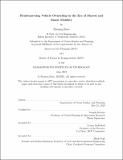| dc.contributor.advisor | Joseph Ferreira. | en_US |
| dc.contributor.author | Basu, Rounaq. | en_US |
| dc.contributor.other | Massachusetts Institute of Technology. Department of Urban Studies and Planning. | en_US |
| dc.contributor.other | Massachusetts Institute of Technology. Department of Civil and Environmental Engineering. | en_US |
| dc.date.accessioned | 2020-02-28T20:51:57Z | |
| dc.date.available | 2020-02-28T20:51:57Z | |
| dc.date.copyright | 2019 | en_US |
| dc.date.issued | 2019 | en_US |
| dc.identifier.uri | https://hdl.handle.net/1721.1/123940 | |
| dc.description | This electronic version was submitted by the student author. The certified thesis is available in the Institute Archives and Special Collections. | en_US |
| dc.description | Thesis: M.C.P., Massachusetts Institute of Technology, Department of Urban Studies and Planning, 2019 | en_US |
| dc.description | Thesis: S.M. in Transportation, Massachusetts Institute of Technology, Department of Civil and Environmental Engineering, 2019 | en_US |
| dc.description | Cataloged from student-submitted PDF version of thesis. | en_US |
| dc.description | Includes bibliographical references (pages 163-175). | en_US |
| dc.description.abstract | Emerging transportation technologies like autonomous vehicles and services like on-demand shared mobility are casting their shadows over the traditional paradigm of vehicle ownership. Several countries are witnessing stagnation in overall car use, perhaps due to the proliferation of access-based services and changing attitudes of millennials. Therefore, it becomes necessary to revisit this paradigm, and reconsider strategies for modeling vehicle availability and use in this new era. This thesis attempts to do that through three studies that contribute to the methodological, conceptual, and praxis literatures. The first study proposes a hybrid modeling methodology that leverages machine learning techniques to enhance traditional behavioral discrete choice models used in practice. The usefulness of this model to predict market shares of unforeseen choices like new mobility services is illustrated through an application to the off-peak car in Singapore. | en_US |
| dc.description.abstract | Our model significantly improves upon the market shares predicted by traditional models through an average reduction of 60% in RMSE. The second study shifts the focus from vehicle ownership to vehicle availability in the form of mobility bundles. We leverage Singapore's unique policy environment to empirically model households' preferences for unique mobility bundles that are constructed in an ordinal fashion. This is followed by an examination of car usage within the household. Significant intra-household interaction effects are found with respect to job location, in addition to the observation of gender biases in the decision-making process. The third study evaluates the effectiveness of car-lite policies that seek to replace private vehicle usage with shared and smart mobility services. Behavioral responses to the policy and associated market effects are modeled using an integrated land use transport simulator calibrated for Singapore. | en_US |
| dc.description.abstract | Initially favorable aggregate outcomes tend to disappear as short-term market effects set in. Although outcomes stabilize to a certain extent over the long-term, the initial characteristics of the study area are found to strongly influence the success of such policies. | en_US |
| dc.description.statementofresponsibility | by Rounaq Basu. | en_US |
| dc.format.extent | 175 pages | en_US |
| dc.language.iso | eng | en_US |
| dc.publisher | Massachusetts Institute of Technology | en_US |
| dc.rights | MIT theses are protected by copyright. They may be viewed, downloaded, or printed from this source but further reproduction or distribution in any format is prohibited without written permission. | en_US |
| dc.rights.uri | http://dspace.mit.edu/handle/1721.1/7582 | en_US |
| dc.subject | Urban Studies and Planning. | en_US |
| dc.subject | Civil and Environmental Engineering. | en_US |
| dc.title | Reinterpreting vehicle ownership in the era of shared and smart mobility | en_US |
| dc.type | Thesis | en_US |
| dc.description.degree | M.C.P. | en_US |
| dc.description.degree | S.M. in Transportation | en_US |
| dc.contributor.department | Massachusetts Institute of Technology. Department of Urban Studies and Planning | en_US |
| dc.contributor.department | Massachusetts Institute of Technology. Department of Civil and Environmental Engineering | en_US |
| dc.identifier.oclc | 1140348735 | en_US |
| dc.description.collection | M.C.P. Massachusetts Institute of Technology, Department of Urban Studies and Planning | en_US |
| dc.description.collection | S.M.inTransportation Massachusetts Institute of Technology, Department of Civil and Environmental Engineering | en_US |
| dspace.imported | 2020-02-28T20:51:56Z | en_US |
| mit.thesis.degree | Master | en_US |
| mit.thesis.department | UrbStud | en_US |
| mit.thesis.department | CivEng | en_US |
